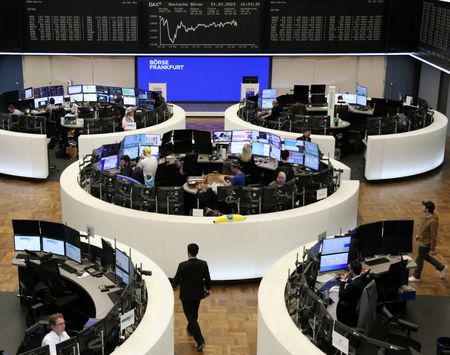By Lucy Raitano and Samuel Indyk
London (Reuters) – Potential downward earnings revisions and uncertainty over the outlook for monetary policy are leading analysts and strategists to take a cautious view on European shares this year, with a key benchmark seen falling slightly in 2023, a Reuters poll found.
The poll of fund managers and strategists surveyed over the past two weeks forecast the STOXX 600 equity benchmark would fall to 443 by the end of 2023, a 4.8% drop from Monday’s close of 464.64.
“Our macro view for 2023 remains bearish. While the 2022 equity market selloff was largely valuation-driven, this year we expect earnings downgrades to drive stocks lower,” said Ankit Gheedia, head of equity and derivatives strategy, Europe at BNP Paribas.
The STOXX 600 is trading close to a one-year high hit on Feb. 16, with the reopening in China, a sharp fall in natural gas prices and robust fourth-quarter earnings helping push the index up over 9% since the start of the year, but this positive momentum is not expected to persist.
Despite the gloomy outlook, several of those polled said the likelihood of a sharp correction in the coming months was small and others took a positive view.
There were also divergent views on how the European Central Bank’s (ECB) rate-hike trajectory would impact equities, with some cautioning the market has been too quick to price in signs inflation is falling as a positive for stocks.
Last week a Reuters poll of economists found the ECB would raise its deposit rate at least twice more, taking the terminal rate to 3.25% in the second quarter, with a vast majority of economists surveyed saying the greater risk is it goes even higher.
The STOXX index of the euro zone’s top 50 blue-chip stocks was seen falling 2.8% from Monday’s close of 4,271.18 to 4,150 by end-2023.
Among country benchmarks, the poll found the outlook for Germany’s DAX was slightly brighter, expected to end the year 0.15% higher at 15,500. Similarly, the UK’s FTSE 100 was forecast to end the year at 8,000, virtually in line with its current level and not far off an all-time high of 8,047.06 touched on Feb. 16.
The FSTE 100 was the first major European index to hit a record high during the recent rally, surging in part due to its lack of technology stocks as well as a resource-heavy and multi-national skew which benefitted from a weaker pound, according to Fiona Cincotta, senior financial markets analyst at City Index.
“We don’t see the FTSE correcting over the coming three months because these factors are likely to remain relevant across H1,” said Cincotta.
“However, as the year progresses, if the global growth story reignites and the pound eventually starts to rise the FTSE could lose momentum and head lower towards the year end.”
The steepest country-specific fall of 8.1% was expected for Spain’s IBEX, while France’s CAC 40, which hit a record high last week, was seen falling 5.5%. Italy’s FTSE MIB was forecast to end the year 1.6% lower than Monday’s close.
(Other stories from the Reuters global stock markets poll package:)
(Reporting by Lucy Raitano, Samuel Indyk and Joice Alves; Additional polling by Aditi Verma, Milounee Purohit and Mumal Rathore; Editing by Jonathan Cable and Shounak Dasgupta)

